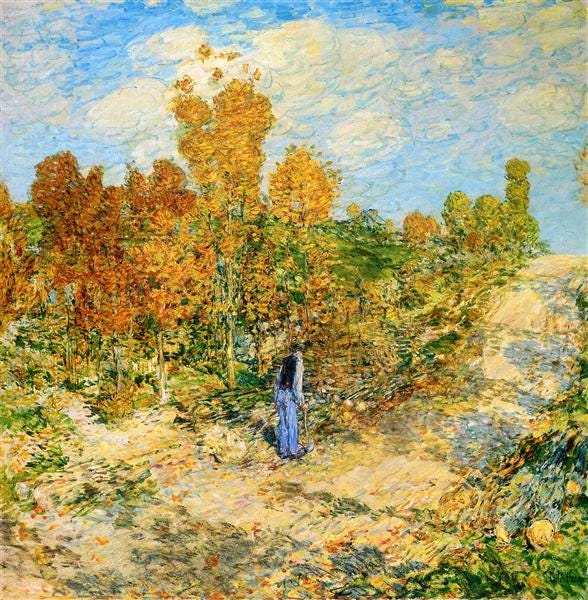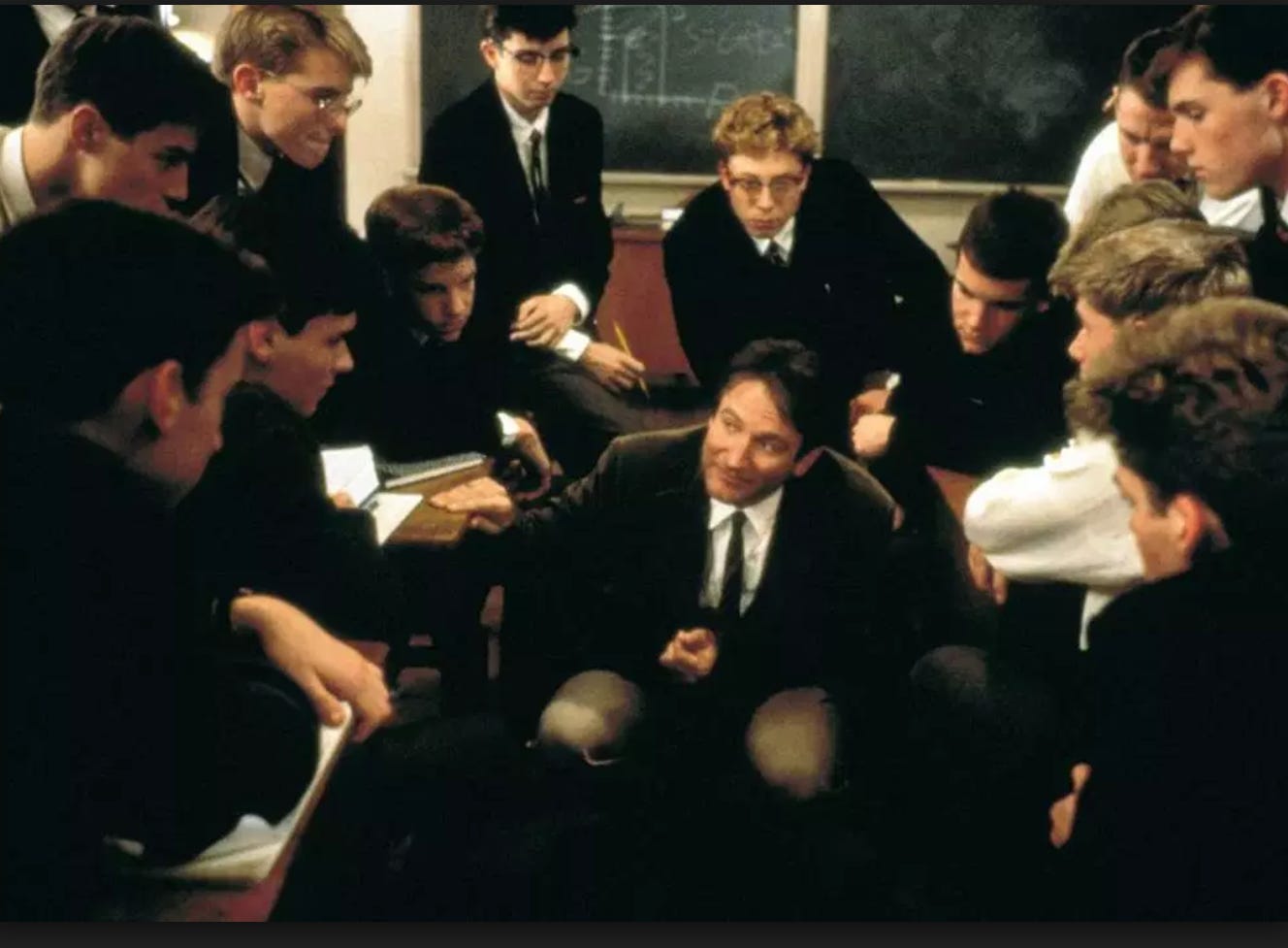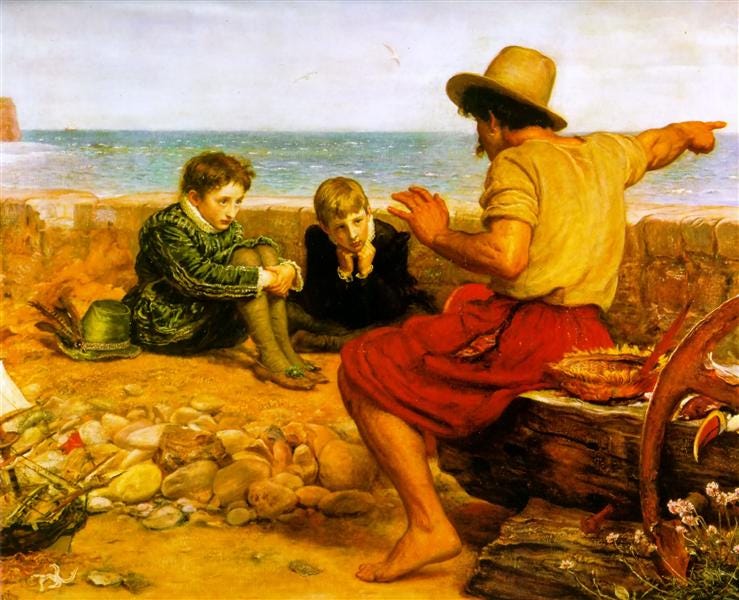Healing the bright wound
On the "uselessness" and indispensability of art, cracking the Machine's cage, Dead Poets Society, and being smote by beauty.
In my previous essay (which I highly recommend reading first), I made the case that we are living in a self-improvement culture that’s making us a) obsessed with optimization and b) unconsciously embrace what Mako Fujimura called “utilitarian pragmatism”:
“The assumption behind utilitarian pragmatism is that human endeavors are only deemed worthwhile if they are useful to the whole, whether that be a company, family or community. In such a world, those who are disabled, those who are oppressed, or those who are without voice are seen as “useless” and disposable. We have a disposable culture that has made usefulness the sole measure of value. This metric declares that the arts are useless. No—the reverse is true. The arts are completely indispensable precisely because they are useless in the utilitarian sense.”
In a self-improvement culture, there is no room for art. There is room only for things which have an explicit, utilitarian purpose. Literature, art, poetry—these are seen as having no practical value in and of themselves.
This is why so many of my colleagues and friends confessed to eschewing fiction for nonfiction books promising practical advice for how to get ahead in life and work. Beneath this trend, I argued, is the assumption that art has little to offer us when it comes to our vocations. In the previous essay I concluded by outlining some of the ways fiction (and the arts in general) can enliven and enrich our work.
In this essay, I want to widen the scope a bit and explore the vital role the arts play in our lives and souls.1
i.
I want to start by focusing on Fujimura’s idea that art is indispensable precisely because it is “useless” in the utilitarian sense.
In one sense, yes, a novel is “useless.” There is no obvious practical value to it. The same is true for other art forms. You do not walk away from a Rembrandt painting, a Terrence Malick film, or a Mary Oliver poem with five practical action steps for how to get more done in less time.
Now consider the back cover copy for a bestselling self-help book:
“The author of [Well-known Book Title]2 and [Not So Well-known Book Title] and ‘master of the life hack’ (GQ) explores the fascinating science of productivity and offers real-world takeaways to apply to your life, whether you’re chasing peak productivity or simply trying to get back on track…
[Somewhat Known Book Title] is a story-filled exploration of the science of productivity, one that can help us learn to succeed with less stress and struggle—and become smarter, faster, and better at everything we do.”
Notice how many explicit promises there are in those sentences and what they appeal to. It’s little wonder books like this sell so well. The promises speak directly to what we value in our optimization-obsessed, self-improvement culture: Peak productivity. Succeed with less stress. Become smarter, faster, and better at everything. Hard to get more practical than that.
Again, I’m not slamming books like this per se. There is undoubtedly value to them. But I think most modern people tend to overestimate the value of such self-help books and vastly underestimate the value of fiction, poetry, art, etc.3
Compare the book copy above to Emily Dickinson’s short poem, “‘Hope’ is the thing with feathers.”
“Hope” is the thing with feathers —
That perches in the soul —
And sings the tune without the words —
And never stops — at all —
And sweetest — in the Gale — is heard —
And sore must be the storm —
That could abash the little Bird
That kept so many warm —
I’ve heard it in the chillest land —
And on the strangest Sea —
Yet, never, in Extremity,
It asked a crumb — of Me.
The poem does not offer itself as a “life hack” or even as a way to become more hopeful. And yet, its words are so deep, delicate, and profound that many have carried them in their heart for a lifetime. I would venture to say that certain souls have been carried by this poem in some of the darkest seasons of their lives.
This is why art’s “uselessness” is the very thing that makes it indispensable. As I said in the previous essay, we are living in the Machine4, which is built on unrestrained purchases, profits, and progress at any cost. It “wires” us to think and live in “-er” terms—i.e. better, faster, easier, more, etc. To the Machine, art simply “does not compute.”5 It doesn’t make sense. But great and “useless” art punches a hole in the industrial cage the Machine has built around our souls. And through this hole, the light of another world and way of being comes streaming in.
ii.
Let me speak plainly: I have come to experience the arts as vital to my life and soul as air or water. That may sound extreme to you, but it is absolutely true.
For one, I believe it has to do with the power of art to bring about a certain kind of transformation in the reader or viewer. In his book An Experiment in Criticism, C.S. Lewis writes about the experience of reading great fiction:
“…the first reading of some literary work is often, to the literary, an experience so momentous that only experiences of love, religion, or bereavement can furnish a standard of comparison. Their whole consciousness is changed. They have become what they were not before.”
This has absolutely been my experience. I have been profoundly shaped by many of the books I’ve read. When I think back on my childhood, some of my fondest memories are reading books like the Redwall series, Harry Potter, The Boxcar Children, Where the Red Fern Grows, The Lord of the Rings, and many others. You simply cannot put into words the depth of joy these books brought into my life.6
In my 20s, I was deeply influenced by books like The Road by Cormac McCarthy, Jayber Crow by Wendell Berry, Silence by Shusaku Endo, A Good Man is Hard to Find by Flannery O’Connor, and East of Eden by John Steinbeck. These days, I am being shaped most by the poetry of Malcolm Guite, T.S. Eliot, Gerard Manley Hopkins, and others.
How does this phenomenon work? Why are we so deeply impacted by great works of art that “only experiences of love, religion, or bereavement can furnish a standard of comparison?” I think the answer has to do with Beauty, which is another reason why art is so crucial to our souls. Outside of nature itself and loving relationships, the arts are the surest line we have to beauty. And beauty, as Jason Baxter so wonderfully argues, matters.
“…beauty is the benevolent manifestation of the eternal within the temporal, a manifestation that reveals itself as an elevating order and in a profound display of power. And so, when human beings experience beauty, we are ‘shocked’ awake. Every experience of beauty comes upon us ‘all of a sudden.’ We feel a strange surge of life within and a longing to reach beyond our ordinary life and our merely mortal state. It’s almost a feeling of woundedness, an awakening to how our lives have been incomplete, hitherto. It’s analogous to falling in love. Beauty is unexpectedly full of life, longing, and surprise. It feels old and new, at once.”
As human beings made in the image of God, I believe we were made for beauty, wonder, awe, and worship. As a Christian, I see the ultimate source of all beauty as the Triune God of the Bible. Even ordinary experiences of beauty in art—whether overtly religious or not—can be “sunbeams that lead us back to the sun.”7
But life in this fallen world tends to squash the wonder in and around us. Living in the Machine can sometimes feel small, tedious, and tawdry. And our rationalistic way of thinking reduces everything to sheer materiality. It brings to mind the scene from The Voyage of the Dawn Treader, when Eustace, Lucy, and Edmund are having a conversation with Ramandu, a star living on a Narnian island near the edge of the world.
“In our world,” said Eustace, “a star is a huge ball of flaming gas.”
“Even in your world, my son, that is not what a star is but only what it is made of.”
Beauty cuts through our rationalistic, materialistic mindset and helps us reclaim the wonder we were made for. As Baxter says, beauty is the eternal breaking into the temporal.
Great art (and the beauty we experience through it) also has a way of opening up something closed off within us. The writer Ursula K. Le Guin puts it this way:
“The daily routine of most adults is so heavy and artificial that we are closed off to much of the world. We have to do this in order to get our work done. I think one purpose of art is to get us out of those routines. When we hear music or poetry or stories, the world opens up again. We’re drawn in — or out — and the windows of our perception are cleansed, as William Blake said. The same thing can happen when we’re around young children or adults who have unlearned those habits of shutting the world out.”
As Le Guin so beautifully attests, art unlocks something within us and awakens us to the glory of the world around us.
iii.
There’s a wonderful example of this in the film, Dead Poets Society. As you recall, the story takes place at Welton, a prestigious all-boys boarding school. Welton is a machine built for one purpose: to get its students into the best colleges possible (so they can go on to have successful careers). It is utterly obsessed with performance and success. As a result, the world the boys occupy is stiflingly narrow and pressure-filled. Nonconformity, idiosyncrasy, and true academic exploration are highly discouraged.
But the Welton machine neglects one thing: it doesn’t really teach the boys how to live. Which is why Robin Williams’ character, John Keating, is so beloved. Like cold water on a drowsy soul, Keating uses poetry to “crack open,” as it were, the shell of the Welton machine and show the boys a vision of life that is far beyond what they had ever imagined.
In one of my favorite scenes, he tells his students:
“We don't read and write poetry because it's cute. We read and write poetry because we are members of the human race. And the human race is filled with passion. Medicine, law, business, engineering—these are noble pursuits and necessary to sustain life. But poetry, beauty, romance, love—these are what we stay alive for. To quote from Whitman, ‘O me! O life!...of the questions of these recurring; of the endless trains of the faithless...of cities filled with the foolish; what good amid these, O me, O life?’ Answer. That you are here—that life exists, and identity; that the powerful play goes on and you may contribute a verse. That the powerful play goes on and you may contribute a verse. What will your verse be?”
Great art reminds us that we are more than just our grades, careers, successes, bank accounts, or possessions. It shakes us awake from our hamster wheel, rat-race way of living.
iv.
In closing, I want to share a final thought on the power of art. In the most trying seasons of my life—seasons marked by heartache, loss, grief, and confusion—I have found a deep solace in certain works of art, and novels in particular.
It is difficult to put into words how or why these books offer such a powerful source of comfort. The closest I can come to describing the experience is through one of my favorite passages from The Lord of the Rings. In this scene, Frodo and Sam lay exhausted in Mordor. Their task seems hopeless. Death seems imminent. Then, Sam looks up into the dark night sky.
“There, peeping among the cloud-wrack above a dark tor high up in the mountains, Sam saw a white star twinkle for a while. The beauty of it smote his heart, as he looked up out of the forsaken land, and hope returned to him. For like a shaft, clear and cold, the thought pierced him that in the end the Shadow was only a small and passing thing: there was light and high beauty for ever beyond its reach.”
Reading a remarkable, beautiful story reminds me that I am in a Story much bigger than myself. And though I may suffer, stumble, and take my share of defeats, the Shadow is only a passing thing. There is a light and high beauty—Christ himself—who will one day “make all the sad things untrue.”8
If you made it this far, thank you for reading! If you found this essay interesting or encouraging in any way, please show your appreciation with a comment, like, restack, or share. It helps spread the word to more people!
What do you think? How has art positively impacted your life and soul? What novels, poems, paintings, and films have shaped you, changed you, or given you comfort in challenging seasons? Let me know in the comments below!
I realize, of course, this is a vast topic that fills the pages of hundreds (if not thousands) of books. But even if I only scratch the surface, I shall venture to say a few things on it.
Leaving out the book titles because I’m not trying to pick on this book or its author. But I think it’s an instructive example. And it is real copy from the back of the book.
A reader of my previous essay left this great quote (though he couldn’t remember the source) in the comments: “Non-fiction increases the width of your understanding, but fiction increases its depth.”
Paul Kingsnorth defines the Machine as “the nexus of power, wealth, ideology, and technology” that has emerged to “replace nature with technology, and to rebuild the world in purely human shape, the better to fulfill the most ancient human dream: to become gods.” For more on this topic, I recommend Kingnorth’s remarkable essay series, The Tale of the Machine.
To borrow a phrase from one of my favorite Wendell Berry poems.
In the preface of An Experiment in Criticism, Lewis writes: “Literary experience heals the wound, without undermining the privilege, of individuality. There are mass emotions which heal the wound; but they destroy the privilege. In them our separate selves are pooled and we sink back into sub-individuality. But in reading great literature I become a thousand men and yet remain myself. Like the night sky in the Greek poem, I see with a myriad eyes, but it is still I who see. Here, as in worship, in love, in moral action, and in knowing, I transcend myself; and am never more myself than when I do.” This expansion of the soul is undoubtedly a big part of why literature can be so life-changing.
Paraphrasing Lewis here.
A beautiful line from that great saint, Samwise Gamgee.










Thank you for these two articles on the need for “useless art” and the power of beauty. I wonder would you write something about the weaponization of beauty? How beauty may be hijacked, if you will, to spread a false idea or even promote wickedness. Certain films come to mind…ones that are full of beautiful people, in beautiful scenery, shot with beautiful cinematography but promoting an utterly false worldview. Can the beauty transcend the falseness?
Beautiful! I really enjoyed reading this and what you say here agrees with my experience. I'm reminded of a scene in Shawshank Redemption. When Andy plays opera music on the loudspeaker, those men out in the prison yard lift their heads up. I like to think the music was so achingly beautiful that it drew them right up out of themselves and made them think of God. This is something I like to ponder - how beauty points to the Divine, how it is life-giving.